Energy-efficient appliances provide numerous benefits, such as lower utility bills and a reduced environmental footprint, all while enhancing the comfort of your home. When selecting these appliances, it’s essential to consider factors like certifications, energy ratings, and warranty options to ensure they meet your household needs effectively.
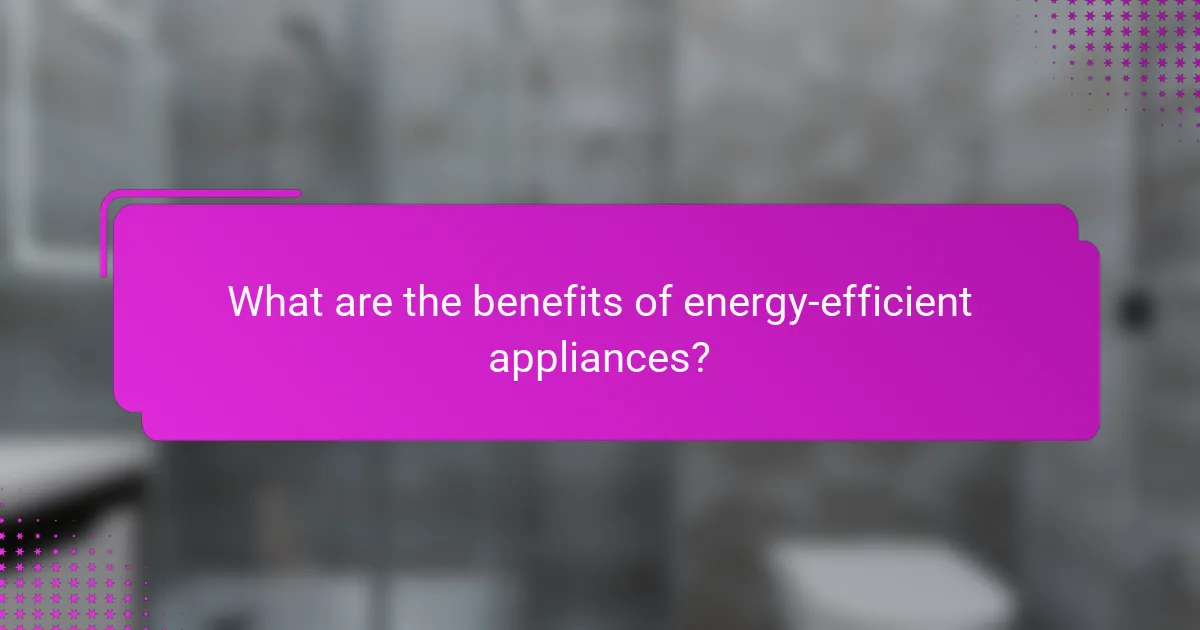
What are the benefits of energy-efficient appliances?
Energy-efficient appliances offer significant advantages, including lower utility costs, reduced environmental impact, and enhanced home comfort. These appliances are designed to use less energy while maintaining performance, making them a smart choice for both homeowners and the planet.
Lower energy bills
One of the most immediate benefits of energy-efficient appliances is the reduction in energy bills. These appliances consume less electricity or gas, leading to savings that can range from 10% to 50% depending on the type and usage. Over time, these savings can add up significantly, making energy-efficient options a cost-effective choice.
When selecting appliances, look for the ENERGY STAR label, which indicates compliance with energy efficiency standards. This label can help you compare potential savings across different models and brands.
Reduced environmental impact
Energy-efficient appliances contribute to a smaller carbon footprint by using less energy, which in turn reduces greenhouse gas emissions. By choosing these appliances, consumers can play a part in combating climate change and promoting sustainability. For instance, using an energy-efficient refrigerator can save hundreds of pounds of carbon dioxide emissions annually.
Additionally, many energy-efficient appliances are designed with recyclable materials, further minimizing their environmental impact. This aspect is crucial for those looking to make eco-friendly choices in their home.
Improved home comfort
Energy-efficient appliances can enhance home comfort by maintaining consistent temperatures and reducing humidity levels. For example, energy-efficient air conditioners and heaters are designed to operate more effectively, ensuring that your living space remains comfortable year-round.
Moreover, these appliances often operate more quietly than their less efficient counterparts, contributing to a more pleasant home environment. This can be particularly beneficial in open-concept living spaces where noise can be disruptive.
Increased property value
Installing energy-efficient appliances can increase the overall value of your property. Homebuyers are increasingly looking for energy-efficient features, as they translate to lower operating costs and a reduced environmental impact. Properties equipped with modern, efficient appliances often sell faster and at higher prices.
When upgrading appliances, consider the long-term return on investment. While the initial cost may be higher, the savings on energy bills and the potential increase in property value can make it worthwhile.
Enhanced technology features
Many energy-efficient appliances come with advanced technology features that improve usability and convenience. For instance, smart appliances can be controlled remotely, allowing users to monitor energy consumption and adjust settings from their smartphones.
These features not only enhance the user experience but also contribute to further energy savings. For example, smart thermostats can learn your schedule and optimize heating and cooling accordingly, ensuring efficiency without sacrificing comfort.
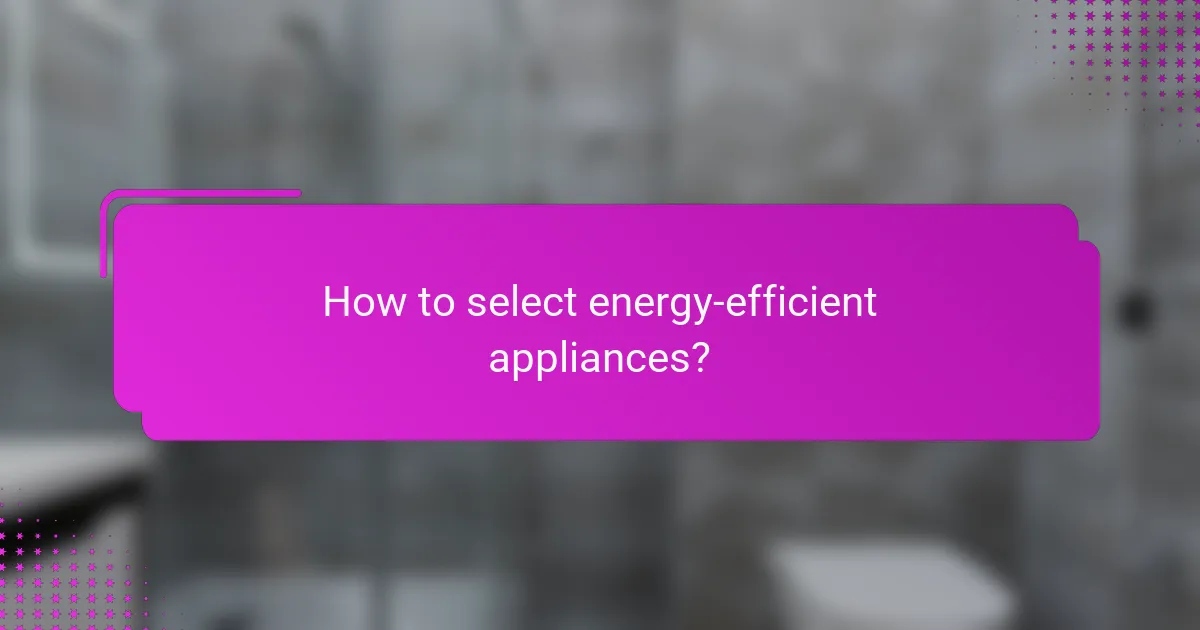
How to select energy-efficient appliances?
Selecting energy-efficient appliances involves understanding their certifications, sizes, energy ratings, and warranty options. Prioritize features that reduce energy consumption while meeting your household needs.
Look for ENERGY STAR certification
ENERGY STAR certification indicates that an appliance meets strict energy efficiency guidelines set by the U.S. Environmental Protection Agency. Appliances with this label typically use 10-50% less energy than standard models, leading to significant savings on utility bills.
When shopping, check for the ENERGY STAR logo on labels and packaging. This certification is available for a wide range of products, including refrigerators, washing machines, and air conditioners, making it easier to identify efficient options.
Consider appliance size and capacity
Choosing the right size and capacity for your appliances is crucial for maximizing energy efficiency. Oversized appliances can waste energy, while undersized ones may not meet your needs, leading to increased usage.
For example, a washing machine that is too large for your household will consume more water and energy than necessary. Assess your typical usage and select appliances that match your household size to optimize performance.
Evaluate energy consumption ratings
Energy consumption ratings provide insight into how much energy an appliance will use over time. Look for the EnergyGuide label, which displays estimated annual energy costs and consumption in kilowatt-hours (kWh).
Compare these ratings among similar appliances to make informed decisions. Generally, lower annual energy costs indicate higher efficiency, helping you save money in the long run.
Assess warranty and service options
A robust warranty and reliable service options are essential when selecting energy-efficient appliances. A good warranty can protect your investment and ensure that any issues are addressed promptly.
Look for warranties that cover parts and labor for at least one year, with extended options available for major appliances. Additionally, consider the availability of local service centers to ensure timely repairs if needed.
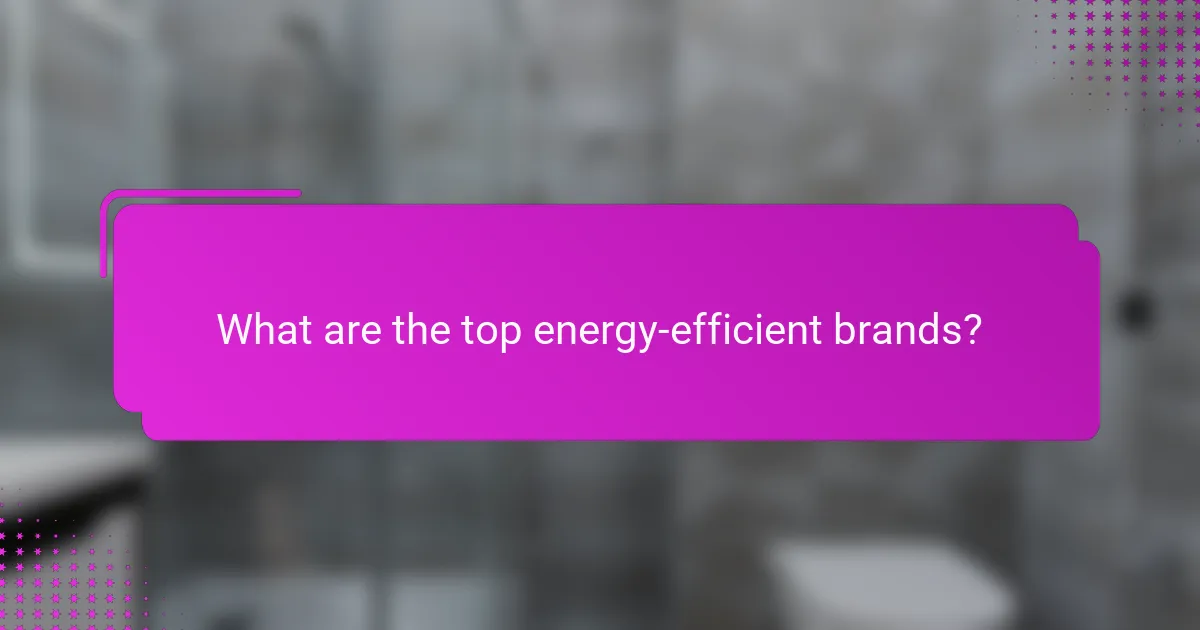
What are the top energy-efficient brands?
The leading energy-efficient appliance brands include Whirlpool, LG, Samsung, and GE Appliances. These manufacturers are recognized for their commitment to producing appliances that minimize energy consumption while maintaining high performance and reliability.
Whirlpool
Whirlpool is known for its wide range of energy-efficient appliances, including refrigerators, washers, and dryers. Their products often feature advanced technologies like adaptive wash cycles and energy-saving modes, which help reduce electricity usage.
When selecting Whirlpool appliances, look for the ENERGY STAR label, which indicates compliance with strict energy efficiency guidelines. This can lead to savings on utility bills over time, making it a practical choice for eco-conscious consumers.
LG
LG offers a variety of energy-efficient appliances that combine innovative technology with stylish design. Their smart appliances often include features such as Wi-Fi connectivity, allowing users to monitor and control energy usage remotely.
Consider LG’s Dual Inverter Compressor technology in refrigerators, which enhances cooling efficiency and reduces energy consumption. This brand consistently ranks high in customer satisfaction for both performance and energy savings.
Samsung
Samsung is a leader in energy-efficient home appliances, particularly in the refrigerator and washing machine categories. Their products often incorporate features like EcoBubble technology, which optimizes washing performance while using less water and energy.
When choosing Samsung appliances, check for their SmartThings integration, which allows for energy monitoring and management through a mobile app. This can help you make informed decisions about your energy usage.
GE Appliances
GE Appliances is committed to sustainability and offers a range of energy-efficient products across various categories. Their appliances often include features like LED lighting and efficient motors, which contribute to lower energy consumption.
Look for GE’s Energy Star certified models, which are designed to meet or exceed energy efficiency standards. Investing in these appliances can lead to significant savings on energy bills while reducing your environmental footprint.
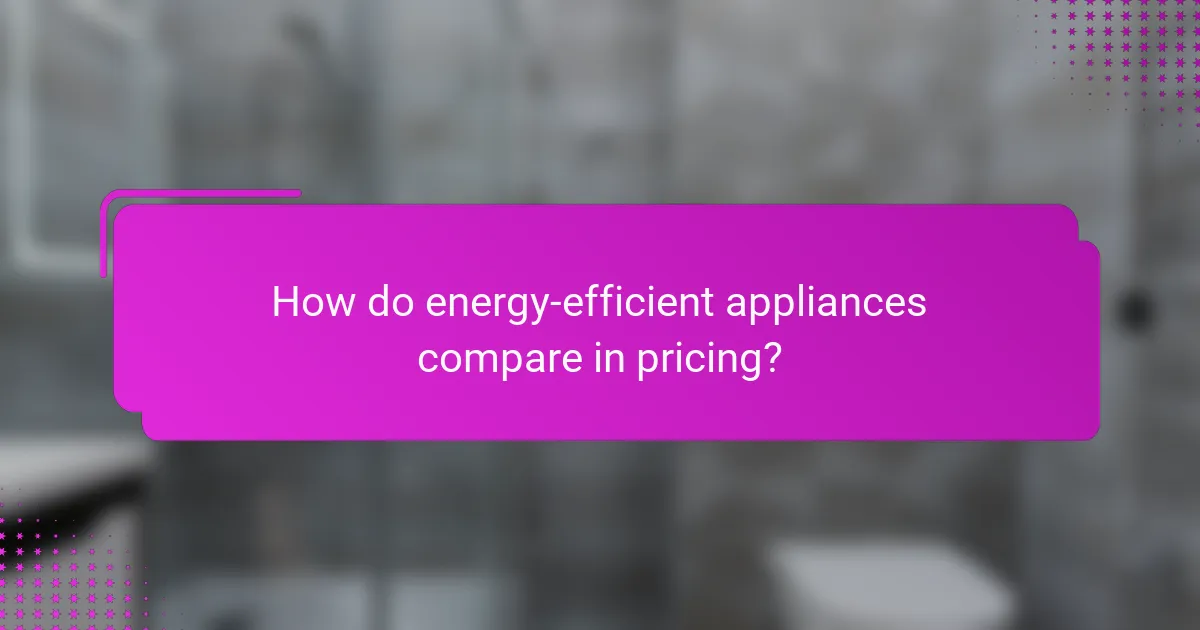
How do energy-efficient appliances compare in pricing?
Energy-efficient appliances typically have a higher upfront cost compared to standard models, but they offer significant savings over time through reduced energy bills. The initial investment can be offset by these long-term savings, making them a financially sound choice for many households.
Initial cost vs. long-term savings
The initial cost of energy-efficient appliances can range from 10% to 50% more than their conventional counterparts. However, these appliances often save consumers hundreds of dollars annually on energy bills. For instance, an energy-efficient refrigerator may cost $200 more upfront but can save about $100 per year in electricity costs.
When considering the long-term savings, it’s essential to factor in the appliance’s lifespan. Many energy-efficient models last longer and maintain their efficiency, further enhancing their value over time.
Financing options available
Many retailers and manufacturers offer financing options for energy-efficient appliances, allowing consumers to spread the cost over several months or years. Zero-interest financing plans are common, making it easier to manage the higher initial costs.
Additionally, some local utility companies provide financing programs specifically for energy-efficient upgrades, which can help reduce the burden of upfront payments while promoting energy conservation.
Local rebates and incentives
Many regions offer rebates and incentives for purchasing energy-efficient appliances, which can significantly lower the effective cost. For example, in the United States, federal tax credits may be available for qualifying appliances, while local utility companies often provide cash rebates for energy-efficient purchases.
It’s advisable to check with local government websites or utility providers to find specific programs available in your area, as these can vary widely and may change annually. Taking advantage of these incentives can enhance the affordability of energy-efficient appliances.
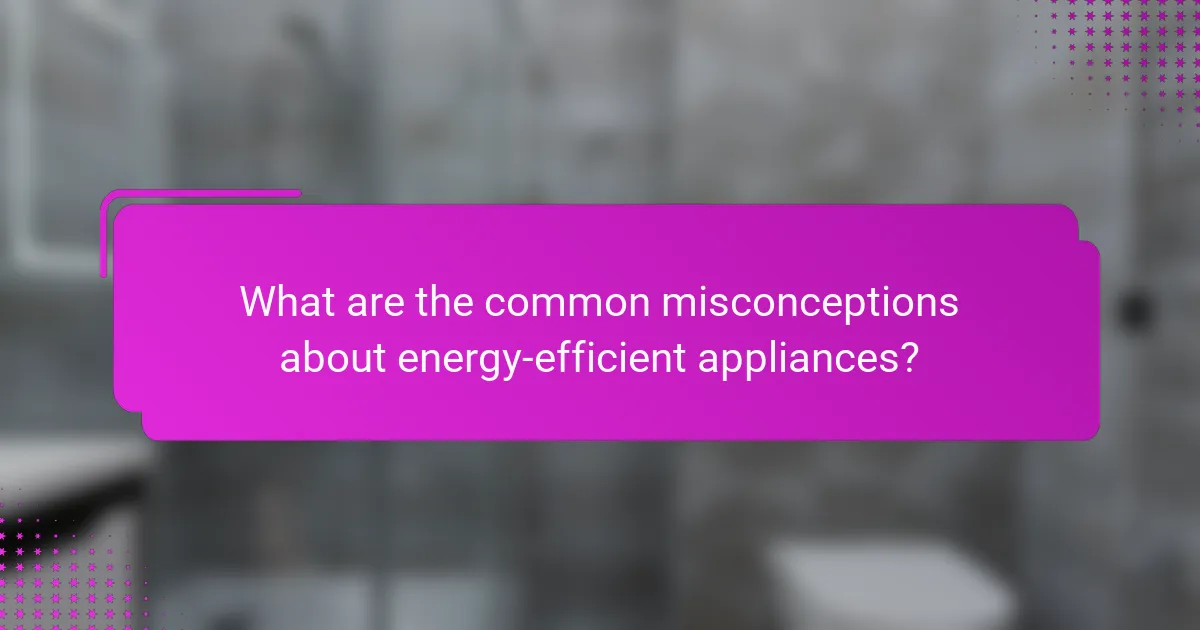
What are the common misconceptions about energy-efficient appliances?
Many people mistakenly believe that energy-efficient appliances are significantly more expensive upfront or that they do not perform as well as traditional models. In reality, while the initial cost may be higher, the long-term savings on energy bills often outweigh this expense, and modern energy-efficient appliances are designed to deliver comparable or superior performance.
Energy-efficient appliances are too expensive.
A common misconception is that energy-efficient appliances come with a hefty price tag. While it’s true that some models may cost more initially, many energy-efficient options are available at various price points, often with rebates or incentives that can help offset the cost. Over time, the savings on energy bills can lead to a return on investment that makes these appliances more economical.
They don’t perform as well as traditional appliances.
Another myth is that energy-efficient appliances sacrifice performance for energy savings. In fact, advancements in technology have led to energy-efficient models that often outperform their traditional counterparts. For example, modern energy-efficient washing machines use less water and energy while providing superior cleaning results.
All energy-efficient appliances are the same.
Not all energy-efficient appliances are created equal. It’s essential to look for specific certifications, such as ENERGY STAR, which indicates that the appliance meets strict efficiency guidelines. Additionally, different appliances may have varying energy consumption levels, so comparing the energy use of similar models can help you make an informed choice.
They are not worth the investment.
Some consumers believe that the savings from energy-efficient appliances are negligible. However, the cumulative savings on utility bills can be significant over the lifespan of the appliance, often amounting to hundreds or even thousands of dollars. Moreover, many energy-efficient appliances come with warranties that can extend their lifespan, further enhancing their value.


